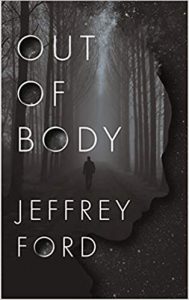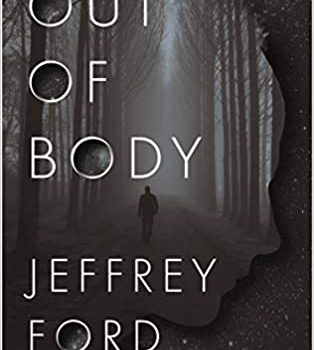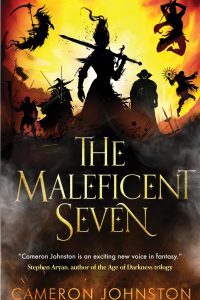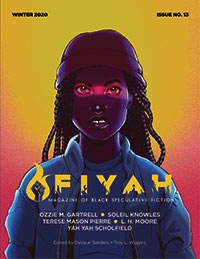Gary K. Wolfe Reviews Out of Body by Jeffrey Ford
 Out of Body, Jeffrey Ford (Tor.com 978-1-250-25015, $14.99, 168pp, tp) May 2020.
Out of Body, Jeffrey Ford (Tor.com 978-1-250-25015, $14.99, 168pp, tp) May 2020.
Jeffrey Ford is consistently one of the most graceful writers we have, and when he decides to revisit some of the classic tropes of horror fiction – such as the haunted house in his recent The Twilight Pariah and “The Jeweled Wren” – we can reliably expect a couple of things. For one, the clarity of the telling will be such that we almost seem to be experiencing the trope for the first time, and for another, that trope isn’t where the story is really going anyway. Much the same is true of Out of Body, which begins as a vivid rendering of the ancient notion of out-of-body experiences, but ends up revisiting another classic horror trope, the exact nature of which it would be imprudent to reveal here. As in The Twilight Pariah, the setting is a small suburban town, where the protagonist manages a fading institution – a local museum in the earlier story, a public library already scheduled for closure in this one – lending the story an elegiac undertone from the very beginning. Owen, the librarian, is a creature of habit, wearing one of two suits each day and stopping at the same convenience store for coffee on his way to work. When he is caught up in a robbery and murder at the convenience store one morning, his routine is shattered, and that night, while experiencing sleep paralysis, he begins having a series of out-of-body experiences that enable his astral self to move freely around town, easily passing through walls while invisible to most of those he visits – though at any moment he may be yanked back to his sleeping body.
The ability to snoop around undetected is not without hazards. When Owen meets another “sleeper” named Melody, she warns him that if the silver cord connecting sleepers to their physical bodies is severed, the physical body dies and the spirit becomes a malevolent ghost, seeking to sever the cords of other travelers. Even scarier is the miasma, a kind of floating yellow cloud which not only kills the sleeper, but wipes out their entire history in the waking world, as though they never existed. There is, in other words, a system to the night world, but Ford offers only a sketch of it before shifting the story into more conventional horror territory, outlining a mystery that goes back decades and that involves a mysterious, flaking mural in Owen’s library, a group of people – including the convenience-store murderer and a local gas station attendant – who share the same cryptic tattoo, a novelist whose plotting notes take up her entire room, a reclusive artist, and a middle-aged library patron who seems to view herself as a kind of local Jessica Fletcher.
All this seems like enough material for what might be a much longer novel in less adept hands, but Ford’s economy of place and character is such that the town of Westwend takes on a texture comparable to Sherwood Anderson’s Winesburg or Bradbury’s Green Town, with Owen’s nightmarish experiences forcing him to confront the choices he has made, or failed to make, about his own life. Although it has its share of gruesome moments, including a conclusion that plays out in both the sleeping and waking worlds, Out of Body is most memorable as a dark and lyrical fable of unexpected courage and unwanted responsibility, set in the sort of evocative town that already seems to be fading into memory.
Gary K. Wolfe is Emeritus Professor of Humanities at Roosevelt University and a reviewer for Locus magazine since 1991. His reviews have been collected in Soundings (BSFA Award 2006; Hugo nominee), Bearings (Hugo nominee 2011), and Sightings (2011), and his Evaporating Genres: Essays on Fantastic Literature (Wesleyan) received the Locus Award in 2012. Earlier books include The Known and the Unknown: The Iconography of Science Fiction (Eaton Award, 1981), Harlan Ellison: The Edge of Forever (with Ellen Weil, 2002), and David Lindsay (1982). For the Library of America, he edited American Science Fiction: Nine Classic Novels of the 1950s in 2012, with a similar set for the 1960s forthcoming. He has received the Pilgrim Award from the Science Fiction Research Association, the Distinguished Scholarship Award from the International Association for the Fantastic in the Arts, and a Special World Fantasy Award for criticism. His 24-lecture series How Great Science Fiction Works appeared from The Great Courses in 2016. He has received six Hugo nominations, two for his reviews collections and four for The Coode Street Podcast, which he has co-hosted with Jonathan Strahan for more than 300 episodes. He lives in Chicago.
This review and more like it in the May 2020 issue of Locus.
 While you are here, please take a moment to support Locus with a one-time or recurring donation. We rely on reader donations to keep the magazine and site going, and would like to keep the site paywall free, but WE NEED YOUR FINANCIAL SUPPORT to continue quality coverage of the science fiction and fantasy field.
While you are here, please take a moment to support Locus with a one-time or recurring donation. We rely on reader donations to keep the magazine and site going, and would like to keep the site paywall free, but WE NEED YOUR FINANCIAL SUPPORT to continue quality coverage of the science fiction and fantasy field.








